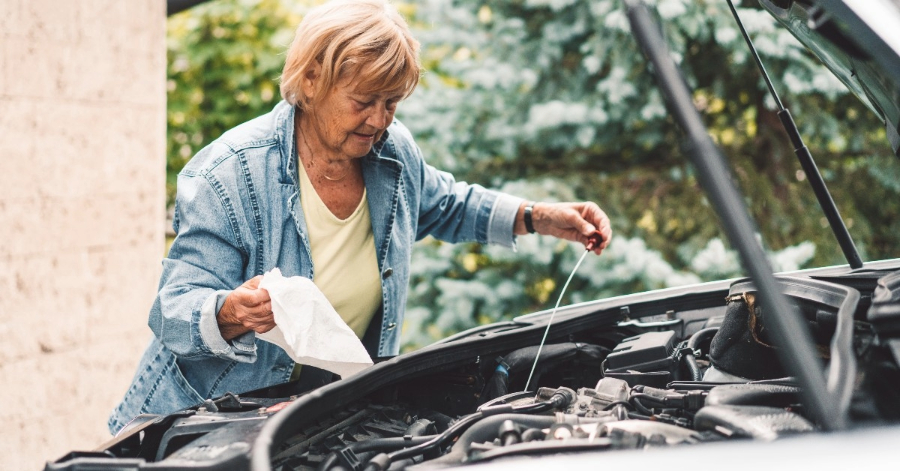Are you one of the many drivers who rely solely on their trusted mechanics for all things car-related? While it's true that some repairs do require a professional touch, there's a lot of basic vehicle maintenance you can tackle on your own. At MetzWood, it’s important to us that you feel empowered when it comes to maintaining your car. By taking proactive steps to care for your vehicle, you demonstrate responsible ownership and lower the overall risk profile, which can lead to potential insurance premium discounts and cost savings for both you and the insurance company. Here are some steps you can implement that can help you take control of your regular maintenance.
Check Your Tires Monthly
Your tires are the only thing between your car and the road, making their maintenance crucial for safety and performance. Inspect your tires monthly for wear and tear, and make sure they are properly inflated. The correct tire pressure can be found on a placard located on the driver's door jamb or in your owner's manual. Remember to inflate your tires when they are cold to get an accurate reading.
Change Your Oil and Oil Filter on Schedule
Engine oil is essential for your engine's well-being, as it lubricates crucial parts and prevents damage. Neglecting regular oil changes can lead to engine problems. Consult your owner's manual for the recommended oil type and change intervals. Checking your oil level is easy: simply locate the dipstick, wipe it clean, reinsert it, and check the oil level against the "FULL" and "ADD" marks.
Replace the Air Filter With Oil Changes
The air filter is responsible for keeping the air entering your engine clean. You should inspect and replace it once or twice a year, depending on your driving habits. To check its condition, remove the filter and visually inspect it. If it's dirty or clogged, replace it to ensure optimal engine performance.
Inspect All Other Fluids
Motor oil isn't the only fluid that needs attention. Regularly check brake fluid, transmission fluid, coolant, and windshield washer fluid levels. Most fluids can be visually inspected or checked with a dipstick, as outlined in your owner's manual.
Examine Belts and Hoses
Inspecting the belts and hoses in your engine bay can help prevent serious issues. Damaged or worn hoses can lead to coolant leaks, while worn belts, especially the timing belt, can cause engine damage. Look for signs of wear, such as cracks, bulges, or material loss, and replace them promptly if needed.
Keep on the Lookout for Brake Issues
Brakes are crucial for your safety. Pay attention to how your brakes feel and any unusual sounds while driving. Squealing may indicate worn brake pads while grinding can signal more severe issues. Address any brake problems promptly to ensure safe driving.
Replace Wiper Blades as Needed
Maintaining clear visibility is vital for safe driving. If your wiper blades streak or make noise, it's time to replace them. High-quality wiper blades provide better performance and durability, so invest in reputable brands. Changing wiper blades is a simple DIY task that can save you from driving with compromised visibility.
Remove Battery Corrosion
Battery terminals can accumulate corrosion over time, affecting your car's electrical system. Use a wire brush and a water and baking soda solution to clean the terminals and ensure a reliable connection.
How To Jump Start a Dead Battery
Knowing how to jump-start a car is a valuable skill for any driver. Luckily, there are some thorough resources available that can walk you through exactly how to jump your dead car battery. Brush up on instructions like these, and be prepared if you or someone you know is stranded with a dead battery.
Proper car maintenance significantly reduces the risk of accidents and breakdowns, which can lead to insurance claims. Regularly serviced and well-maintained vehicles are less likely to experience sudden mechanical failures or malfunctioning parts that could contribute to accidents. Furthermore, maintaining your car ensures that safety features, such as brakes, tires, and lights, are in optimal condition, reducing the likelihood of accidents and associated insurance claims. Ultimately, car maintenance is a win-win for all parties involved, promoting safer roads and more cost-effective insurance coverage.
By following these basic car maintenance tips, you'll not only extend the life of your vehicle but also reduce the likelihood of unexpected breakdowns. Plus, you'll have the satisfaction of taking control of your car's health and saving money on routine maintenance tasks.
Want to review your auto insurance with a trusted professional? Reach out to us today!
Share This Article


